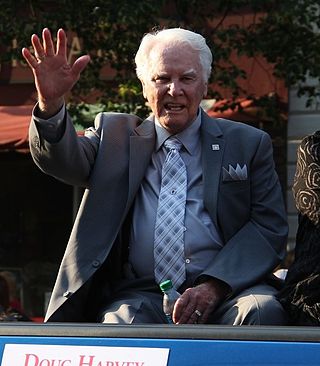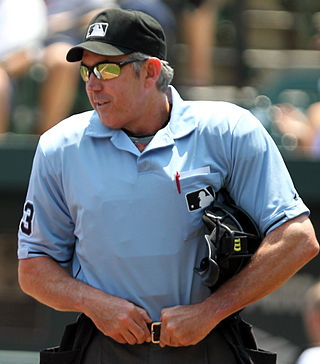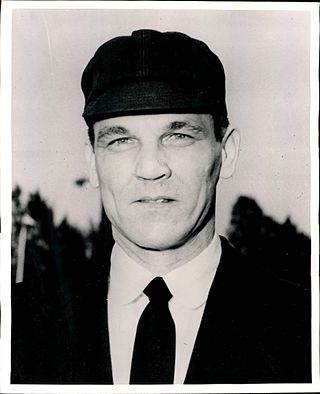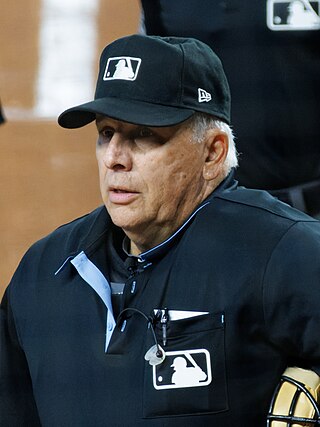
In baseball, the umpire is the person charged with officiating the game, including beginning and ending the game, enforcing the rules of the game and the grounds, making judgment calls on plays, and handling the disciplinary actions. The term is often shortened to the colloquial form ump. They are also sometimes addressed as blue at lower levels due to the common color of the uniform worn by umpires. In professional baseball, the term blue is seldom used by players or managers, who instead call the umpire by name. Although games were often officiated by a sole umpire in the formative years of the sport, since the turn of the 20th century, officiating has been commonly divided among several umpires, who form the umpiring crew. The position is analogous to that of a referee in many other sports.

Harold Douglas Harvey was an umpire in Major League Baseball (MLB), who worked in the National League (NL) from 1962 through 1992.
Bruce Neal Froemming is Major League Baseball Special Assistant to the Vice President on Umpiring, after having served as an umpire in Major League Baseball. He first umpired in the National League in 1971, and from 2000 to 2007 worked throughout both major leagues. Early in the 2007 season, Froemming tied Bill Klem for the most seasons umpired. Previously, on August 16, 2006, Froemming umpired his 5,000th game between the Detroit Tigers and Boston Red Sox at Fenway Park, making him the second umpire to reach that milestone; Klem retired after 5,374 games. Froemming now stands third on the all-time list of games umpired, having been passed when Joe West officiated his 5,164th Major League Baseball game on August 14, 2019. On April 20, 2007, he umpired at first base in the Cleveland Indians-Tampa Bay Devil Rays game, passing Klem to become – at age 67 years 204 days – the man then believed to be the oldest umpire in major league history; Hank O'Day holds the record, retiring at 68 years, 2 months. He worked his final regular-season game at age 68 years 2 days on September 30, 2007, when Froemming received a standing ovation before umpiring his last regular-season game, manning the third base position as the Milwaukee Brewers hosted the San Diego Padres at Miller Park in his native Milwaukee, with much of his family in attendance. Because Froemming was then over age 65, he became eligible for election to the Baseball Hall of Fame in 2010 instead of having to wait the customary five years.

Brian Scott Gorman is an American former umpire in Major League Baseball. After working in the National League from 1991 to 1999, he umpired in both leagues from 2000-2021. Gorman was promoted to crew chief in 2010. He is the son of Tom Gorman, who served as an NL umpire from 1951 to 1977. He wore uniform number 9 throughout his career.

Julius Edward "Chuck" Meriwether was a Major League Baseball (MLB) umpire. After working in the American League (AL) from 1988 to 1999, he umpired in both leagues from 2000 to 2009. Meriwether originally wore number 32, but in 2004 switched to number 14.

Gary Richard Darling is a former umpire in Major League Baseball. After beginning his career in the National League from 1986 to 1999, he worked throughout both major leagues from 2002 until his retirement in 2014. He wore uniform number 37.

John Patrick McSherry was an American umpire in Major League Baseball who worked in the National League from 1971 until his death. McSherry wore uniform number 9 when he entered the National League, then wore number 10 from 1979 through the rest of his career. A respected arbiter, he was one of several umpires who were noticeably obese. McSherry was officially listed at 6 feet 2 inches (1.88 m) and 328 pounds (149 kg). On April 1, 1996, the opening day of the 1996 Major League Baseball season, McSherry suffered a fatal heart attack while calling a game in Cincinnati.

Timothy Reid McClelland is an American former umpire in Major League Baseball who worked in the American League from 1983 to 1999 and throughout both leagues from 2000 through the 2013 season. He called many important games, from post-season games to the George Brett "Pine Tar" game in 1983. He was the plate umpire for the Sammy Sosa corked bat game on June 3, 2003, when the Chicago Cubs hosted the Tampa Bay Devil Rays at Wrigley Field. He wore uniform number 36 after his promotion to the AL, and kept the number when Major League Baseball merged the American and National League umpiring staffs in 2000.

Edward George Barrett is an American retired Major League Baseball umpire. He joined the American League's staff in 1994, and has worked throughout both major leagues since 2000. Promoted to crew chief in 2013, Barrett worked in 33 play-off series, including five World Series. He retired following the 2022 season.

Edward Stephen Rapuano Jr. is an umpire supervisor in Major League Baseball who previously worked as an on-field umpire in the National League from 1990 to 1999 and throughout both major leagues from 2000 to 2012.

Michael John Winters is an American former umpire in Major League Baseball who has worked in the National League from 1988 to 1999 and throughout both major leagues from 2000 to 2019, wearing number 33. For the 2011 season, Winters was named a crew chief following the retirements of Jerry Crawford, Mike Reilly, and Chuck Meriwether.

Henry Charles "Shag" Crawford was an American professional umpire in Major League Baseball who worked in the National League from 1956 to 1975. During his twenty seasons in the National League, Crawford worked more than 3,100 games and as a home plate umpire was notable for getting in a low crouch and resting his hands on the back of the catcher in front of him. Crawford wore number 2 after the National League adopted numbers for its umpires, which was then transferred to his son Jerry Crawford, who wore it from 1976 until his 2010 retirement.

Fieldin Henry Culbreth III is an American former umpire in Major League Baseball (MLB). He worked in the American League from 1993 to 1999 and in both major leagues from 2000 until his retirement in 2021. Culbreth was promoted to crew chief prior to the 2013 season. Culbreth wore number 42 while he was an American League umpire, then changed to 25 in 2000 after the MLB umpires were unified into one crew.

Frank Victor Pulli was a professional baseball umpire, working in the National League from 1972 until 1999. He umpired many postseason games, including four World Series. Pulli wore uniform number 14 during his career.

Thomas Francis Hallion is a retired Major League Baseball umpire who worked in the National League (NL) from 1985 to 1999 and in both major leagues from 2005 until 2022. He was promoted to crew chief in 2010. Hallion has worn number 20 during his MLB career. He resigned from the NL in 1999 as part of a failed mass bargaining strategy, but he was rehired by MLB before the 2005 season.

James Norris Reynolds IV is a former American Major League Baseball umpire. He joined the major league staff in 1999 and was promoted to crew chief for the 2020 season. Reynolds wore uniform number 77. He retired following the 2022 season.
The Major League Umpires Association (MLUA) was a union for the umpires of both the American League and the National League. It was formed in 1970. It was decertified and replaced by the World Umpires Association, which became the bargaining agent for MLB umpires before the 2000 season.
The 1999 Major League Umpires Association mass resignation was a labor tactic used by 68 Major League Baseball (MLB) umpires, including 66 members of the Major League Umpires Association (MLUA), the official umpires union at the time. Unable to strike because they had a labor agreement in place at the time, 57 umpires formally resigned by orchestrated letters in an attempt to force negotiations with MLB for a new labor agreement. The American and National Leagues instead immediately hired new umpires and accepted 22 of the resignations. The union membership became fractured on the issue, and the umpires tried to rescind their resignations, but the MLUA was unsuccessful in retaining the jobs of the 22 umpires and the resignations were seen as final. The incident led to the decertification of the MLUA and the formation of a new union, the World Umpires Association (WUA), now the Major League Baseball Umpires Association.

Larry Wayne Vanover is an American professional baseball umpire. Vanover worked in the National League from 1991 to 1999. He did not umpire in 2000 and 2001, and since 2002 has umpired across both major leagues. Vanover has umpired two All Star Games, and in the 2016 World Series. He was promoted to crew chief in 2015. Vanover wore sleeve number 28 during his National League tenure, then changed to 27 after his return to the MLB umpiring staff in 2002.
The 1979 Major League Umpires Association Strike was a labor action by the Major League Umpires Association (MLUA) against Major League Baseball (MLB) that lasted from March until mid-May, 1979.
















